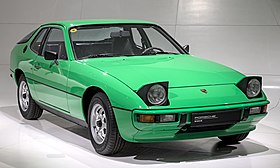
Back Porsche 924 Afrikaans بورش 924 Arabic Porsche 924 Azerbaijani Porsche 924 Catalan Porsche 924 Czech Porsche 924 German Porsche 924 Spanish Porsche 924 Estonian Porsche 924 Basque پورشه ۹۲۴ Persian
| Porsche 924 | |
|---|---|
 | |
| Overview | |
| Manufacturer | Porsche AG |
| Production | 1976–1988 |
| Assembly | Germany: Neckarsulm, Stuttgart |
| Designer | Harm Lagaay (Porsche AG) |
| Body and chassis | |
| Class | Sports car |
| Body style | 2-door 2+2 coupé |
| Layout | Front mid-engine, rear-wheel-drive |
| Powertrain | |
| Engine | |
| Transmission | 3-speed automatic 4-speed manual 5-speed Getrag manual |
| Dimensions | |
| Wheelbase | 2,400 mm (94.5 in) |
| Length | 4,200 mm (165.4 in) |
| Width | 1,685 mm (66.3 in) |
| Height | 1,270 mm (50.0 in) |
| Curb weight | 1,080 kg (2,381 lb) |
| Chronology | |
| Predecessor | Porsche 914 |
| Successor | Porsche 944 |
The Porsche 924 is a sports car produced by Porsche in Neckarsulm, Germany, from 1976 until 1988. A two-door, 2+2 coupé, the 924 replaced the 912E and 914 as the company's entry-level model.
Although the 928 was designed first, the 924 was the first production road-going Porsche to use water cooling and a front-engine, rear-wheel-drive layout. It was also the first Porsche to be offered with a conventional fully automatic transmission. Like the 914, the 924 began as a joint venture with Volkswagen (VW). Although VW withdrew from the project before production, early 924s used VW engines as originally planned.
The 924 made its public debut in November 1975 and a turbocharged version was introduced in 1978. In response to increasing competition, Porsche introduced an upgraded version with a new Porsche-built engine as the 944, which replaced the 924 in the U.S. in 1983. In 1985, VW discontinued the engine used in the 924, prompting Porsche to use a slightly detuned 944 engine in the 924, rename the vehicle as the 924S, and reintroduce it in the U.S. The 924 was a sales success, with just over 150,000 produced.